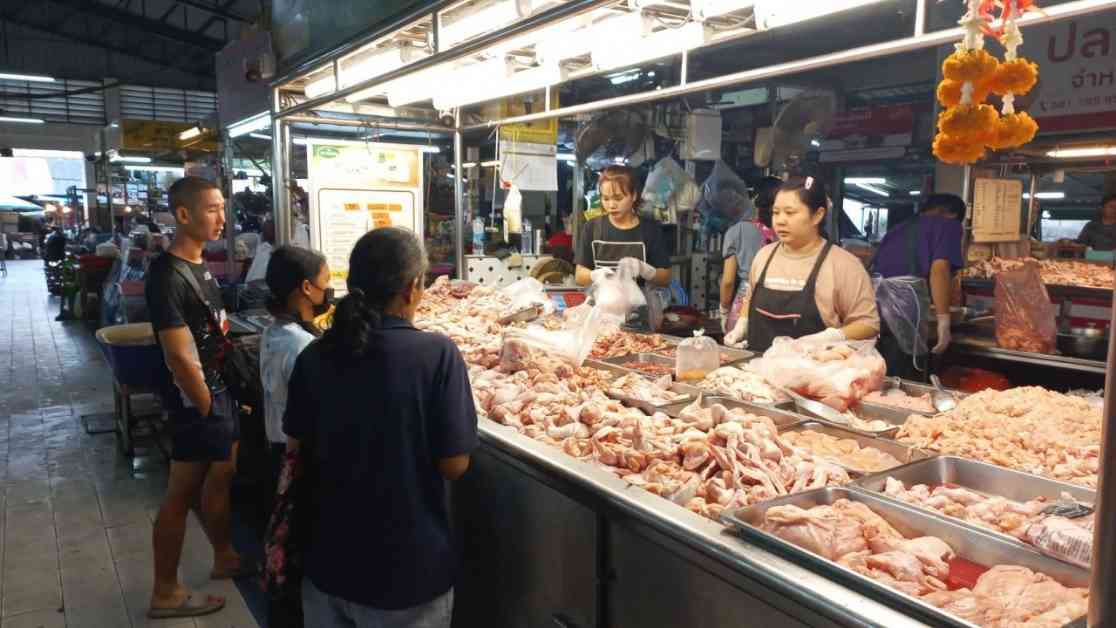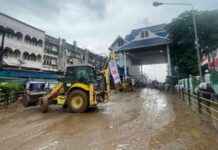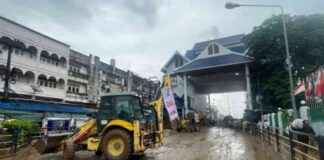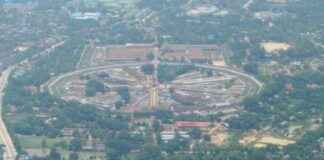Impact of Toxic Chinese Chemicals on Economy and Religious Practices
The recent influx of toxic Chinese chemicals into the market has caused a significant economic downturn in the region, leading to a reduction in the worship of deities and ancestral spirits. This silent and lonely world is a stark contrast to the vibrant and bustling marketplace that once thrived in this community.
At the heart of the issue is the reluctance of traders to increase their stock of livestock such as pigs and chickens for sale. The toxic chemicals have not only affected the health of these animals but also the livelihoods of those who rely on them for income. As a result, the economy has suffered, with fewer transactions taking place at the local market.
During a visit to the Puksanulokkruamjai Market on August 16, 2567, reporters observed the impact of the toxic chemicals on the prices of pork and chicken. It was evident that the prices of pork at the fresh market were lower than those at supermarkets, indicating a shift in consumer behavior. Traders were also hesitant to stock up on chicken for sale, as the demand for these products had decreased due to the economic downturn.
Ms. Rai, a chicken vendor at the Puksanulokkruamjai Market, noted the increase in prices of fresh chicken due to the toxic Chinese chemicals. She mentioned that the prices of different types of chicken had risen, with egg-laying hens priced at 120 baht per kilogram, Thai chickens at 170 baht per kilogram, and chicken meat at 90 baht per kilogram. The prices of boiled chicken for worshipping had also increased to between 160-200 baht per piece.
On the other hand, the prices of fresh pork were found to be lower at the fresh market compared to supermarkets. For instance, three-layered pork was priced at 160-170 baht per kilogram at the fresh market, while supermarkets sold the same product at 180 baht per kilogram. This disparity in prices further highlighted the impact of the toxic Chinese chemicals on the local economy.
Traditional Chinese Festival and its Significance
The traditional Chinese festival, known as the Festival of Ancestors, is a significant cultural event for the Chinese community. It is a time when families come together to honor their ancestors and pay respects to their deceased loved ones. The festival is steeped in tradition and serves as a way for the younger generation to remember and honor their ancestors.
One of the key customs of the Festival of Ancestors is the preparation of offerings for the deceased. These offerings typically include a variety of food items, sweet treats, silver and gold paper, and clothing. These offerings are then taken to the gravesites of the deceased for worshipping.
This year, the Festival of Ancestors coincided with Sunday, August 18, 2567, with the day of offerings falling on Saturday, August 17, 2567. However, due to the economic downturn caused by the toxic Chinese chemicals, the observance of the festival was noticeably subdued. Fewer families were seen participating in the traditional rituals, and the market for offerings and worship items had also shrunk.
The reduced worship of deities and ancestral spirits during the Festival of Ancestors is a reflection of the challenging times faced by the community. The impact of the toxic Chinese chemicals on the local economy has not only affected the livelihoods of traders but also the cultural practices of the people.
Efforts to Overcome Economic Challenges and Preserve Cultural Heritage
Despite the economic challenges brought about by the toxic Chinese chemicals, the community is resilient and determined to overcome these obstacles. Local traders have started exploring alternative sources of income and diversifying their products to adapt to the changing market conditions.
One such initiative is the promotion of organic and locally sourced products to attract environmentally conscious consumers. By highlighting the benefits of these products and emphasizing their quality and safety, traders hope to regain the trust of their customers and revitalize the local economy.
In addition to economic strategies, there is also a renewed focus on preserving cultural heritage and traditions in the face of adversity. Community leaders are working to educate the younger generation about the significance of the Festival of Ancestors and other cultural practices, ensuring that these traditions are passed down for generations to come.
Overall, the impact of the toxic Chinese chemicals on the local economy and religious practices has been profound. However, the community is united in its efforts to overcome these challenges and preserve its cultural heritage in the face of adversity. Through resilience, innovation, and a strong sense of community, the people of this region are determined to rebuild and thrive once again.




















